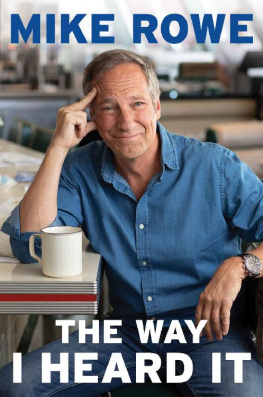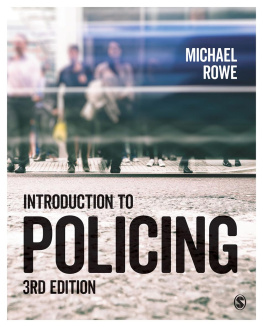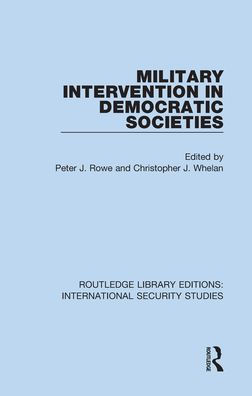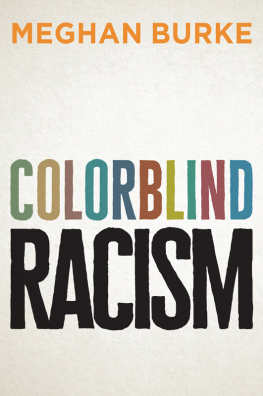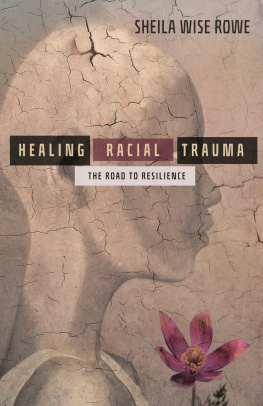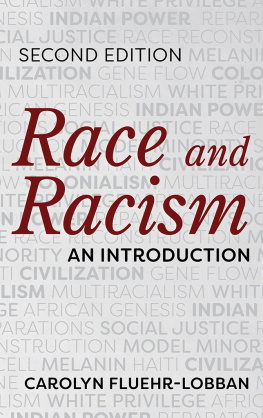Policing, Race and Racism
Policing and Society Series
Series editors: Les Johnston, Frank Leishman, Tim Newburn
Published titles
Policing, Ethics and Human Rights, by Peter Neyroud and Alan Beckley
Policing: a short history, by Philip Rawlings
Policing: an introduction to concepts and practice, by Alan Wright
Psychology and Policing, by Peter B. Ainsworth
Private Policing, by Mark Button
Policing and the Media, by Frank Leishman and Paul Mason
Policing, Race and Racism, by Michael Rowe
First published by Willan Publishing 2004
This edition published by Routledge 2012
2 Park Square, Milton Park, Abingdon, Oxon OX14 4RN
711 Third Avenue, New York, NY 10017
Routledge is an imprint of the Taylor & Francis Group, an informa business
Michael Rowe 2004
The rights of Michael Rowe to be identified as the author of this book have been asserted by him in accordance with the Copyright, Designs and Patents Act of 1988.
All rights reserved; no part of this publication may be reproduced, stored in a retrieval system, or transmitted in any form or by any means, electronic, mechanical, photocopying, recording or otherwise without the prior written permission of the Publishers or a licence permitting copying in the UK issued by the Copyright Licensing Agency Ltd, 90 Tottenham Court Road, London W1P 9HE.
Paperback
ISBN-13: 978-1-84392-044-1
Hardback
ISBN-13: 978-1-84392-045-8
British Library Cataloguing-in-Publication Data
A catalogue record for this book is available from the British Library
Typeset by TW Typesetting, Plymouth, Devon
Project managed by Deer Park Productions, Tavistock, Devon
Contents
List of tables and figures
Table 8.1: Models of policecommunity relations
Acknowledgements
I am happy to acknowledge the very many people who have helped to shape the ideas that underpin this book. Much of the primary material that is incorporated into the following chapters has been gathered as part of various research projects conducted for police services in England and Wales between 1999 and 2003. More than 200 police officers, police support staff and members of the public engaged in police training gave their time generously and shared their perspectives on the impact of the Lawrence Report, and I am very grateful for their cooperation. I am also indebted to Sam Johnson who, as a research assistant, conducted many of these interviews, and to Rob Pugsley who was project administrator. Jon Garland was also heavily involved in these research projects and read draft versions of several of the chapters that follow and I owe him a huge debt for the many years of discussion and debate that have helped me shape half-baked ideas into something resembling a systematic and rational analysis.
Over several years students enrolled in postgraduate courses at the Scarman Centre at the University of Leicester have provided an excellent forum in which I have been able to develop understanding of policing, race and racism. It is a paradox of the educational process that the person ostensibly delivering teaching may learn more about the subject matter at hand than the students who might expect to profit from their lectures and seminars. I hope that the postgraduate students who have attended my classes in recent years have learnt from them and I am pleased to record my sincere thanks to them for their generous support.
As always, the biggest debt is owed to Anna, Derry, Maggie and Niall, without whom as someone else once said this book would have been written in half the time. I wouldnt have had it any other way, though.
Michael Rowe
Chapter 1
Introduction
Two significant anniversaries passed during the period in which this book has been written, both of which led the media to reassess the state of race, racism and the British police service. April 2003 saw the tenth anniversary of the murder of Stephen Lawrence marked with a memorial service that was attended by many high-profile figures alongside his family and friends. Eight months later the media devoted many column-inches to reviewing the extent to which progress had been made in the five years since publication of the Macpherson Report in January 1999. In many respects this book seeks to add to this debate by taking as a recurring theme the question: What has changed since Macpherson?. While what is outlined in the following chapters is intended to provide a thorough analysis of the myriad of policies and initiatives that have been generated in the half decade since the Lawrence Report appeared, it is emphasised at the outset that a definitive answer to that question remains elusive. As much as can be stated with any certainty is that those responsible for managing and leading the police service have developed a raft of measures in response to the Lawrence Report that have covered a very wide range of police activity. The extent to which these have improved the quality of service that minority ethnic communities receive from the police is, however, much more difficult to discern and it is certain that the gulf in public trust and confidence in the police that Macpherson identified has not been fully bridged.
While milestones such as these invite debate and discussion, some of the themes reviewed in the chapters that follow are subject to recurring media scrutiny, as racist and deviant police officers have entered public discourse about law and order. In October 2003 a BBC documentary, The Secret Policeman , revealed extreme racist attitudes expressed by a number of police officers undergoing basic training at Bruche, near Warrington (BBC, 2003). The programme contained secretly filmed footage of anofficer donning a Ku Klux Klan-style white hood, improvised out of a pillowcase, and boasting that he would like to kill Asians and bury them under the train tracks if he could get away with it. Another officer boasted that he would issue minority ethnic motorists with fixed penalties in circumstances where he would let white people escape with an informal caution. A third officer claimed that he joined the police service because he knew it was a racist organisation and it would allow him to look after his own. As the journalist who had gone undercover to make the programme noted, the clandestine footage, recorded with poor lighting, focus and soundtrack, was reminiscent of the earlier surveillance material of the suspects in the Lawrence murder case, which showed them practising their knifing techniques and boasting of their racism.
Both the programme itself and the huge public outcry that it occasioned revealed some interesting wider dimensions about policing, race and racism in contemporary British society. First, condemnation of the officers views emanated from across the police establishment. Several forces were implicated in the programme, since the probationer officers were serving in North Wales, Cheshire and Greater Manchester Police, and senior officers were quick to condemn the racist attitudes the programme had revealed. The documentary itself contrasted the official prohibition of racist language with earlier footage, recorded in the 1980s, of an interview with the then chairman of the Police Federation, Les Curtis, who defended police officers use of the term black bastard on the grounds that such expressions were commonly used in society at large. In response to the 2003 documentary no senior officer, Federation spokesperson, or government official sought to defend the racist attitudes that had been revealed on the grounds that these were privately expressed or that these could be distinguished from the professional standards of behaviour to which officers were expected to adhere. Neither did the police seek consolation in an oft-cited claim that the police service reflects the worst elements of the wider society that it serves as well as the best. As is outlined later in this book, these attitudes towards racism in the police that crude stereotyping is unfortunate but does not impact on behaviour, or that it reflects broader problems in society have been advanced in the past by those seeking to marginalise or downplay the issue.



